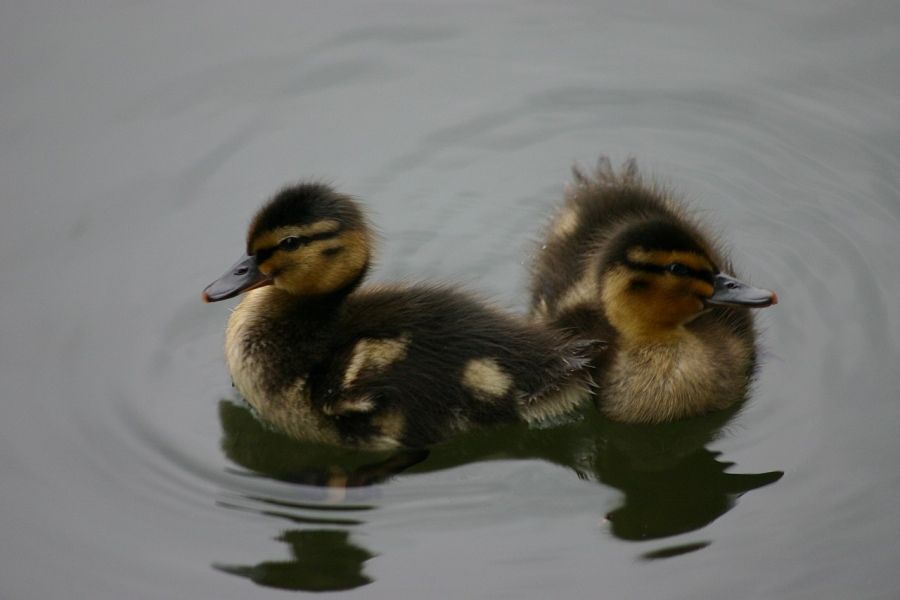
- Free Article: No
- Contents Category: Short Story
- Custom Article Title: Ducks
- Review Article: No
- Article Title: Ducks
- Online Only: No
- Custom Highlight Text:
Have you ever looked at a duck? There is more to it, to use that peculiar cliché, than meets the eye. Watching ducks has been my labour for some time, but, of course, it will be so only for a limited period. Still, I expect I will always retain the interest now that I have come to know ducks better.
In the Gardens it is quiet but for a surrounding rumble from beyond the outer walls. A gardener pulls a thick hose behind him, watering tiny new seedlings, spots of green on black earth. I signal to him and he nods back, knowing me, knowing the time of my arrival here each day. Away in front of me I see the flying foxes are there as usual, hanging in thick knots from the tip of the hoop pine. Their smell reaches me already and I can see some of their number stirring in their rest, stretching dark, webbed wings.
I do not linger but move quickly on to the main pond where the ducks await me. Ah my friends, good morning, I say aloud as I put my bag down on the customary bench near the waterside. I am about to say more when I notice that the girl is there again over on the other bench in the shade beneath the black bean tree. I feel a small pang of disappointment, liking as I do to be alone with the birds for at least a few minutes at the beginning of each day.
Yes, but the ducks have seen me and are swimming across. Just look at them, coming here so quickly, gliding. Look down into the water and you will see their webbed feet churning while, up above, their bodies remain composed, plumage perfectly arranged, everything still except for a slight rhythmic nodding of their heads.
See more closely the intricate arrangement of duck feathers. Have you ever seen a glove artichoke before the flower is allowed to open? Well, these feathers are like that, tightly made, one layer fitted beneath the next and then each part crossing the one behind it. That is nature, organised in beauty. Here are two ducks moving past me. They have fine black lines above and below each eye, marked as crisply as eye shadow very carefully applied.
I have observed that the girl on the other bench wears eye shadow sometimes. For months she has come here nearly every morning wearing her school uniform, just before the boy arrives. The first day he appeared he sat next to her and perhaps they talked, side by side, looking across the water, their hands resting in their laps. I cast bread upon the water and noticed the boy too.
It is the colour of duck feathers that varies so much. Otherwise these birds are predictable. The movements of ducks are consistent. They glide, they bob their heads, they duck down into the water all in the same way. Is that why they are called ducks, because they duck? If people had a name which was descriptive in this way, what would we be called? That is an interesting question, I think.
I reached the pond one morning and discovered the girl sitting on the boy's lap. Just like that, across his knees, side-saddle. She had an arm behind his head and the other hand raised to his cheek, and they kissed. Just like that, before school.
It is the green feathers which I like most, green necks, deep green sides. And then brown and beige above, in fine patterns, like woven rugs but finer.
Ah, here comes that duck with the five ducklings. The ducklings, still fluff covered, swim in a line and the duck moves outside them, keeping them near the edge of the water. Yesterday I watched this group and saw one duckling dart ahead, paddling out in front of its siblings. Why would it do that, do you think? The duck rushed forward and gathered it quickly back into the line.
They were there again, perhaps it was the next morning, the boy now astride the girl, riding in the traditional manner, his legs up on the bench on either side, his back to me, her hands clasped around his waist. This was the way it has been most mornings, here before school.
Drakes, of course, like all birds, have no member. They have an opening. They ride behind the duck and position themselves so that their opening is aligned with the opening of the duck, the cloaca, and there they squirt the seed. It would be interesting if people were made this way. There might be less merging of the flesh, an alignment of orifices and then, through air, a stream of fluid. How would we adapt to this? Some will say there would be little difference. There are cynics amongst us.
Feathers, look at them, here, this morning. Bottle green they are, and black, white, brown, beige, and the bills too, some grey, some green, and that one there bright plastic yellow. Today the girl sits on the bench beneath the black bean tree, demure in her uniform, the deep green blazer and skirt, a fine red ribbon tying back her hair. She looks out across the water. This day she is alone, her hands lying in her lap.


Comments powered by CComment